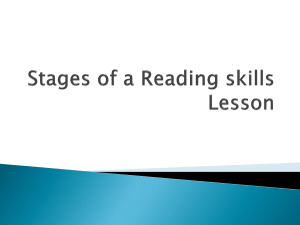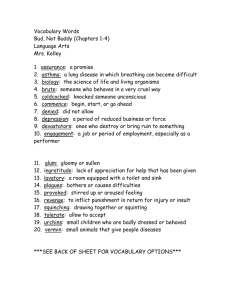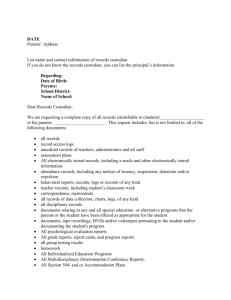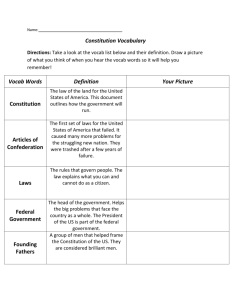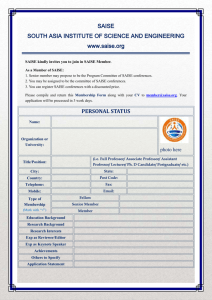Preparation for College Reading and Writing ENGLISH 098
advertisement
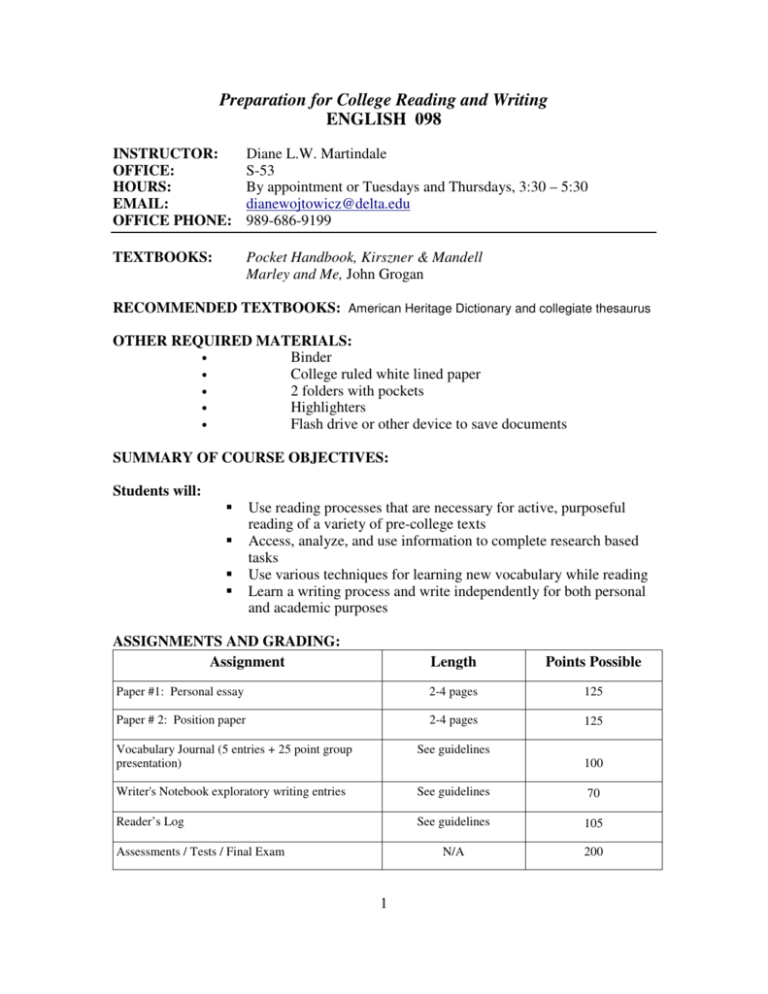
Preparation for College Reading and Writing ENGLISH 098 INSTRUCTOR: OFFICE: HOURS: EMAIL: OFFICE PHONE: Diane L.W. Martindale S-53 By appointment or Tuesdays and Thursdays, 3:30 – 5:30 dianewojtowicz@delta.edu 989-686-9199 TEXTBOOKS: Pocket Handbook, Kirszner & Mandell Marley and Me, John Grogan RECOMMENDED TEXTBOOKS: American Heritage Dictionary and collegiate thesaurus OTHER REQUIRED MATERIALS: • Binder • College ruled white lined paper • 2 folders with pockets • Highlighters • Flash drive or other device to save documents SUMMARY OF COURSE OBJECTIVES: Students will: Use reading processes that are necessary for active, purposeful reading of a variety of pre-college texts Access, analyze, and use information to complete research based tasks Use various techniques for learning new vocabulary while reading Learn a writing process and write independently for both personal and academic purposes ASSIGNMENTS AND GRADING: Assignment Length Points Possible Paper #1: Personal essay 2-4 pages 125 Paper # 2: Position paper 2-4 pages 125 Vocabulary Journal (5 entries + 25 point group presentation) See guidelines Writer's Notebook exploratory writing entries See guidelines 70 Reader’s Log See guidelines 105 N/A 200 100 Assessments / Tests / Final Exam 1 Assignment Length Total: Points Possible 750 *Both major papers must be turned in or the student will receive and E, despite his/her average grade. GRADE SCALE: 95% - 100% = 90% - 94% = 87% - 89% = 84% - 86% = 80% - 83% = A AB+ B B- 77% - 79% 74% - 76% 70% - 73% 67% - 69% 64% - 68% = = = = = C+ C CD+ D COURSE POLICIES: Attendance Policy Regular attendance is essential for successfully completing this course. Students are to be present when class begins and stay until the class is dismissed. There is no distinction between excused and unexcused absences. If a student is unable to attend class, s/he is responsible for communicating with the instructor by phone or email prior to the class meeting time. S/he is responsible for getting any new assignments and delivering any work which is due THAT day. Instructor Initiated Drop for Lack of Attendance Your English Division instructor will drop you from this course if you miss, for any reason, in excess of 2/15 of your classes for this course. For this particular course this semester (or term) that means in excess of 2.5 class periods or 8 hours of instruction. This is an English Division policy. Late work No late work will be accepted without prior arrangement. Missed work from in-class assignments can not be made up outside of class. Style and Form All formal written assignments must be typed, double spaced, and 12 CI. Reading logs, writer's notebook entries, and vocabulary journal entries may be handwritten. Disabilities If you have a documented disability which affects your academic performance, and need an academic accommodation, please contact the Office of Disability Services in D102. The telephone number is 686-9330. Mike Cooper, Disability Services Director, D-WING, D102, 989686-9322. Integrity of Academic Work (From the Delta College Catalog) I. Statement of Values The principles of truth and honesty are fundamental to a community of learners. All members of the Delta College Community are expected to honor these principles and are responsible for maintaining the integrity of academic work at the College. 2 Plagiarism or any misrepresentation of work, unsanctioned collaboration, use of prohibited materials, and participation in any form of dishonesty all constitute violation of this policy. Violations of this policy will result in the actions and consequences specified within this policy. II. Faculty determine standards of integrity for academic coursework. Examples of academic dishonesty that would constitute violations of this policy include, but are not limited to, the following: • Plagiarism* • Cheating on tests, quizzes, or any assignments • Fabrication • Aiding and abetting dishonesty • Falsification of records and official documents *Plagiarism is defined as, “the false assumption of authorship; the wrongful act of taking the product of another person’s mind and presenting it as one’s own.” As developed by Alexander Lindey in “Plagiarism and Originality” (N.Y.: Harper,1952) III. Faculty and Staff Responsibilities. • Faculty should do the following, where applicable and when appropriate: • Provide clarification about the nature of academic dishonesty. • Clarify expectations for homework, assignments, collaborative student efforts, research papers, exams, etc. • Identify any specific style/format requirements for assignments. • Communicate ethical and professional standards associated with courses and programs. • Honor principles of truth and honesty and in so doing protect the validity of college grades. IV. Student Responsibilities and Rights Delta College Students are responsible for understanding/following • All provisions of this policy including, but not limited to, examples under I and II above. • Specific course policies for academic work. • Other College policies as specified in the current Delta College Catalog. • Commonly understood principles of personal honesty and integrity. 3 The student may appeal, through the Disputed Final Grades policy, any grade affected by a charge of academic dishonesty. V. Process for Policy Violations by Students Faculty may use their discretion and judgment in any suspected violation of this policy, including limiting action to a warning. If the faculty member determines that this policy has been violated, then the process outlined below will be followed. If the faculty member decides that a violation of this policy will not affect the student’s assignment or course grade, the faculty member will explain the violation to the student and warn the student of future consequences for similar behavior. If a faculty member decides that a violation of this policy will affect the student’s grade in the course, then the faculty member will explain the decision in writing to the student within a reasonable time frame. The faculty member will then send copies of the written explanation to the appropriate Division Chair, Academic Dean, and the Chief Academic Officer of the College. Both the Division Office and Academic Office will maintain permanent records of these violations. When a violation is reported to the Academic Office, the Chief Academic Officer of the College will determine appropriate consequences beyond the course grade for the student, including, particularly in the case of a repeated violation of this policy, possible dismissal from the College. STUDENT RESOURCES: Instructor: Required student / teacher conferences will be scheduled through out the semester, however, students may feel free to seek our the instructor for help at any given time. Teaching / Learning Center (TLC) and Writing Cafe: These locations provide additional tutoring services that can help students at any stage of the writing process. Disruptive Students (See Delta College Catalog for specific procedures) Disruptive conduct taints the educational atmosphere and may endanger the safety of students and staff. Accordingly, when student conduct on campus creates a serious enough disruption such that the only reasonable solution is removal of the student, a faculty/staff member may temporarily suspend or permanently expel that student from class/campus. 4 TENTATIVE SCHEDULE: Note: This assignment schedule provides a general idea of the topics covered in the course. The number, length, and content of sessions may vary and is subject to change. Session 1 Activities • • • • • • Responsibilities Introduction activities Reflection logging Review syllabus Discuss Reading Log / Writer's Notebook/ Vocab Journal Preview and Predict: Marley and Me Active Reading Strategies: Questions and Connections • • • • 2 3 4 Composition: • Introduction to the Writing Process • Distribute guidelines / rubric for Paper # 1 • Prewriting activities Vocabulary: • Using context clues to unlock meaning • 100 words every college student should know • Word building and thinking activities – Millionaire game Reading: • Annotating text: Insert strategy • M&M: Partner talk and whole group share Composition: • Discuss paragraph structure • Model outlining, paper # 1 Vocabulary: • Review context clues, share logs Reading: • Summarizing strategy • Summarizing activity • M&M: Comprehension Assessment 1 Composition: • Model drafting an essay • Introductions and lead seeds, Group Activity Vocabulary: • Using word parts (structural clues) to predict meaning • Word building and thinking activity: Memory game Reading: • M&M tear and share discussion 5 Read M&M preface, ch. 1- 5 RL 1: 1 prediction, 2 questions, 3 connections WN 1: Describe who you were 10 years ago and who you will be 10 years from now Vocab Journal entry # 1 Use two prewriting strategies to narrow topic for Paper #1 and generated ideas/ details you may include in your essay • • • • Read M&M ch. 6 -10 RL 2: Summarize 6 -10 Vocab Journal entry # 2 WN 2: Respond to exploratory prompt Create outline for Paper # 1 • Complete rough draft of Paper # 1 Session 5 Activities Responsibilities Composition • Overview: Six + 1 traits of writing • Evaluating student sample thesis, supporting details • Peer review Vocabulary: • Review word parts, share logs Reading: • Inferencing • Inferencing activity • M&M: Comprehension Assessment 2 • • • • • 6 7 8 9 Read M&M ch. 11 -15 RL 3: Choose a character and infer the emotions of that character and also the reason behind an action they took in the plot Vocab Journal # 3 BRING IN OBJECT FOR VOCAB ACTIVITY WN # 3: Respond to exploratory prompt or free write Composition: • Teacher / Student Conferences and peer review Vocabulary: • Word building and thinking activities: Object association • Using a dictionary Reading: • M&M: Role play favorite part Complete 2nd draft of Paper # 1 Composition: • Conventions: The Four Most Serious Errors • Editing Workshop / online activities • Continue Teacher -Student Conferences Vocabulary: • Review dictionary skills(online game), share logs Reading: • Visualization • Visualization activity • M&M: Comprehension Assessment 3 • • Composition • Conclusion strategies / formatting an essay • Publishing Vocabulary: • Word building and thinking activities (Group 1) • Using a thesaurus Reading: • M&M: Share reading logs Composition: • Reflection Logging • Hand in papers • Introduce rubric for Paper # 2 / Position Paper Vocabulary: • Review thesaurus, share logs Reading: • Narrative profundity • M&M: Comprehension Assessment 4 6 • • Read M&M 16 -20 RL 4: 1 prediction, 2 questions, 3 connections, 1 visualization Vocab journal # 4 WN # 4: Respond to exploratory prompt or free write Paper # 1 Due next class!!! • • • • Read M&M 21-25 RL 5: Write a summary of this section and respond to an event using the profundity scale Vocab journal # 5 WN # 5: Respond to exploratory prompt or free write Session 10 11 12 13 14 Activities Responsibilities Narrow topic, compose a research Composition: question. • Library Tour • Prewriting: Choosing a topic, narrowing it down • Types of resources, locating the right information Vocabulary: • Word building and thinking activities (Group 2) Reading: • Identifying organizational patterns in text • Graphic organizer activity Read M&M 26 – 29 RL 6: Compare and contrast book to movie WN # 6: Respond to exploratory prompt or free write MID TERM CONFERENCES Composition: • Gather resources for paper; article, web site, book Vocabulary: • Share logs Reading: Watch Marley and ME movie • • Composition: • Outline paper and write rough draft • Quoting, paraphrasing, summarizing • Draft a quote, paraphrase, summarization handout Vocabulary: • Word building and thinking activities (Group 3) Reading: • Comprehension Carousel • Preview chapter 29 of handbook. What questions do you have? • Complete outline and rough draft for Position paper Composition Review integrating quotes • Teacher / Student Conferences • Peer Conference Vocabulary • Word building and thinking activities (Group 4) Reading • Marley and Me Final Test Composition: Review paraphrasing • Citing and documenting resources correctly • Teacher / Student Conferences • Peer Conference Vocabulary: • Word building and thinking activities (Group 5) Reading: • SQ3R • SQ3R group activity 7 • STUDY FOR MARLEY AND ME TEST! • WN # 7: Respond to exploratory prompt or free write Continue revising position paper...add quote to your rough draft • Draft your works cited page! • Continue revising position paper...paraphrase a segment of an article that supports your thesis Session 15 16 Activities Responsibilities Composition: • MLA citation games • Teacher / Student Conferences • Peer conference Vocabulary: • Word building and thinking activities (Group 6) Reading: • Audience / Purpose • Library activity: 5 W's Composition: Collect papers... • Self Evaluation Vocabulary: • Word building and think activities (Group 7) • Review for final exam • Class Evaluations 17 Final exam 18 Exit Conferences 8 Final Position Paper due next class! Study for final exam!
